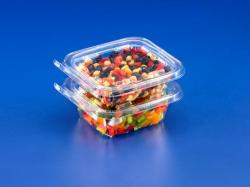Inline Plastics Announces Environmental And Sustainability Enhancements
June 3, 2010 | 1 min to read

Inline Plastics Corp., an industry leader in rigid plastic food containers, continues its drive to improve the environmental and sustainability benefits of its container line. Having previously converted its entire line of packaging to polyethylene terephthalate (PET), the most recycled plastic in the world, Inline’s PET material is now produced using a unique proprietary method. This process achieves such high energy efficiencies that the material now has a carbon footprint as low as competing materials containing 50% post-consumer recycled content from water and soda bottles. For every ton of Inline PET material used, enough CO2 is saved to be equivalent to:
• CO2 emissions from an average passenger car driven 2,723 miles
• CO2 emissions from the refining of 133 gallons of gasoline
• CO2 emissions from consuming 43 propane cylinders used in home gas grills
• CO2 emissions from generating 1,620 kW of electricity
Additional benefits of using Inline’s PET containers include superior clarity and increased resiliency when compared to containers made from post-consumer recycled PET, which lose these attributes through the recycling process. As a result, customers who use Inline PET containers have the dual benefits of low carbon footprint and high sustainability, plus the functional benefits of high quality PET.
Tom Orkisz, President of Inline Plastics Corp. states, “In lieu of following mainstream practice of diverting post-consumer recycled PET from its efficient and low energy use in apparel/interior applications (e.g. clothing fill and carpeting), to less efficient and high energy sheet/thermoforming applications, we took the road less traveled and went with new technology that produces virgin PET sheet with a sustainable carbon footprint advantage over the post-consumer PET recycling processes.”
